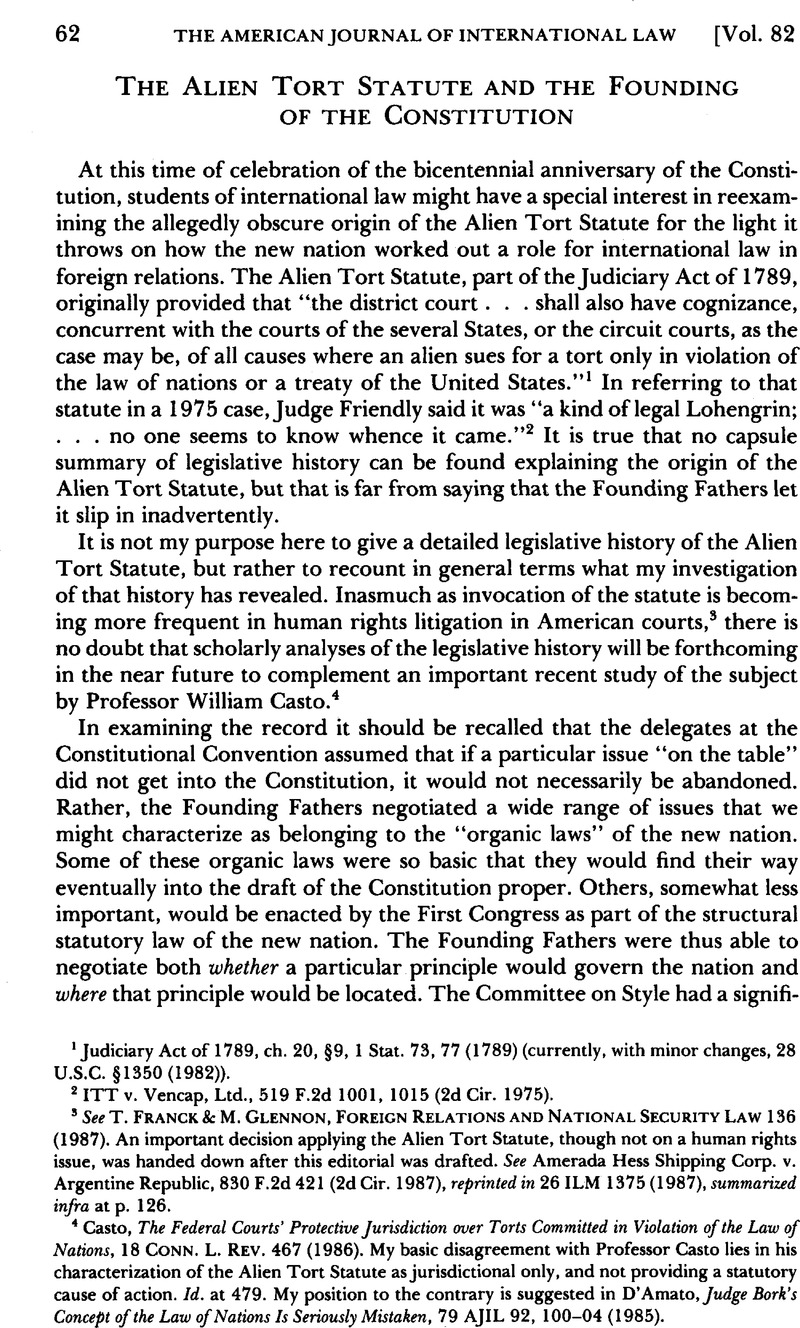Published online by Cambridge University Press: 27 February 2017

1 Judiciary Act of 1789, ch. 20, §9, 1 Stat. 73, 77 (1789) (currently, with minor changes, 28 U.S.C. §1350(1982)).
2 ITT v. Vencap, Ltd., 519 F.2d 1001, 1015 (2d Cir. 1975).
3 See Franck, T. & Glennon, M. Foreign Relations and National Security Law 136 (1987)Google Scholar. An important decision applying the Alien Tort Statute, though not on a human rights issue, was handed down after this editorial was drafted. See Amerada Hess Shipping Corp. v. Argentine Republic, 830 F.2d 421 (2d Cir. 1987), reprinted in 26 ILM 1375 (1987), summarized infra at p. 126.
4 Casto, The Federal Courts’ Protective Jurisdiction over Torts Committed in Violation of the Law of Nations, 18 Conn. L. Rev. 467 (1986)Google Scholar. My basic disagreement with Professor Casto lies in his characterization of the Alien Tort Statute as jurisdictional only, and not providing a statutory cause of action. Id. at 479. My position to the contrary is suggested in D’Amato, Judge Bork’s Concept of the Law of Nations Is Seriously Mistaken, 79 AJIL 92, 100–04 (1985)Google Scholar.
5 The United States, therefore, ended up with a brief Constitution and a lengthy set of organic laws. Some countries (e.g., France) have just the organic legislation, which operates in the aggregate as a Constitution, while others (e.g., South Korea) have a very lengthy Constitution that contains all of the “organic” legislation.
6 Interestingly, the Framers meant by “define” not our current usage, which suggests the idea of “inventing,” but rather the old, broader usage, which emphasized the idea of “articulating” or “recognizing.” See United States v. Smith, 18 U.S. (5 Wheat.) 153, 160–62 (1820) (“piracy” is sufficiently defined under the law of nations as to need no further definition by Congress).
7 Casto, supra note 4.
8 I even suspect that a major factor in the victory of the colonies over Great Britain was the fact that King George lacked specific stories to tell of colonists’ maltreatment of British officials, and hence had to rely on less visceral appeals based on the loss of tax revenue from the colonies. As a result, Britain did not commit the resources to the American Revolution that it could have committed had there been a more persuasive national excuse for mobilizing armies and transporting them across the Atlantic. If I am correct in this assessment, then the revolution was won largely because American leaders in those days accurately perceived the need to couch their demands for independence in terms of political usurpation, while successfully avoiding and for the most part prohibiting what today would be called “terrorism” against British officials or British subjects.
9 3 Vattel, E. de The Law of Nations, bk. II, ch. XVIII, §350, at 230–31 (Carnegie ed. trans. Fenwick 1916)Google Scholar (1758 ed.). The Supreme Court continues to use Vattel as the authoritative source of what the “law of nations” meant to the Founding Fathers. See United States Steel Corp. v. Multistate Tax Comm’n, 434 U.S. 452 (1978).
10 The Federalist No. 80, at 517 (A. Hamilton) (Sesquicentennial Ed. E. M. Earle introd.).
11 So far as I am aware, this specific argument—that the Alien Tort Statute allows suits between alien parties because of the “Arising Under” clause—has not yet been made in an American court. However, it would seem to follow from the Supreme Court’s reasoning in Verlinden B.V. v. Central Bank of Nigeria, 461 U.S. 480, 491–97 (1983) (“Arising Under” clause validates an action by an alien against a foreign nation under the Foreign Sovereign Immunities Act), coupled with The Paquete Habana, 175 U.S. 677, 700 (1900) (“International law is part of our law . . .”).
12 Indeed, the very jurisdictional limitation of $500 operated to drive contract claims of British subjects against American citizens that were for less than $500 into state courts. The $500 limitation thus represented a compromise between the supporters of the national Government who wanted, at least in the larger cases, to ensure the implementation of the Definitive Treaty of Peace concluding the Revolutionary War (“Creditors on either Side shall meet with no lawful Impediment to the Recovery of the full value in Sterling Money of all bona fide Debts heretofore contracted”) and the state-minded delegates who wanted to force British creditors into hostile state courts. Definitive Treaty of Peace, Sept. 3, 1783, United States-Great Britain, 8 Stat. 80, TS No. 104; see Casto, supra note 4, at 507–08.
13 Tel-Oren v. Libyan Arab Republic, 726 F.2d 774 (D.C. Cir. 1984), cert, denied, 440 U.S. 1003 (1985). Given Judge Bork’s reputation for insisting on the original intent of the Framers, it is rather interesting to find him saying in this case that the Framers did not understand separation of powers.
14 For details of the incident, see C. Fyfe, A History of Sierra Leone 59–61 (1962).
15 1 Op. Att’y Gen. 57, 59 (1795).